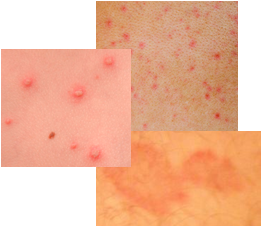Foods to Eat for Rosacea
Visit this
PICTURES OF RASHES PAGE
Foods to eat for rosacea or a diet for rosacea is principally about avoiding the foods that can trigger a rosacea episode or aggravate an already existing rosacea skin care problem rather than being a means of curing rosacea. Before discussing this topic, it is useful to examine the causes of rosacea.
Rosacea Causes
What are the rosacea causes? The Rosacea skin problem causes are not precisely known, but the causes seem to be linked to the abnormal dilation of the small blood vessels in the facial region. People that tend to blush easily appear to be more susceptible to rosacea. Also, fair skinned individuals, those between the ages of 30 and 60, and those going through menopause are more likely to suffer from rosacea.
Why do the blood vessels react in this fashion? Well this is where the uncertainty about the causes of this skin care problem stems from. Like many other skin diseases, there appears to be a hereditary link for some people or in other words those with a family history of rosacea are more likely to suffer from it themselves.
Other possible rosacea skin problem causes that are normally alluded to include sun damage of the skin, the presence of a mite occasionally found in hair follicles, the presence of a bacterium associated with stomach ulcers (helicobacter pyloria) which is linked to the formation of a protein which in turn causes blood vessel dilation, an existing disease of the gastrointestinal area of the body, and medications commonly prescribed for high blood pressure or cholesterol lowering which act to dilate the blood vessels.
Rosacea can be triggered or aggravated by stress and emotional factors, changes in humidity, hot or cold temperatures, wind exposure, sun exposure, perfumes and other cosmetics, consumption of alcohol, consumption of caffeine containing products, eating dairy products, physical activity such as strenuous or perhaps even light exercise, hot showers or hot baths, the consumption of spicy food, eating hot foods, drinking hot beverages, and existing medical conditions such as a cold or high blood pressure.
Avoid High Histamine Foods
In general, the best foods to eat for rosacea sufferers is one that avoids foods high in histamine or foods that act to release histamine in the body once eaten. Foods that possess these properties come from all the food groups. Avocadoes, bananas, red plums, figs, raisins, citrus fruits, and tomatoes are problem fruits. For vegetables, individuals with rosacea should avoid spinach, eggplant, lima and navy beans, and peas. Foods to eat to avoid rosacea should also not include fermented food products. Examples of these are dry cheeses, vinegar, yogurt, soy sauce, sour cream, buttermilk, and finally yeast extract.
Avoid Spicy Foods to Eat for Rosacea
A diet for rosacea should also focus on avoiding any types of spicy foods such as those with black pepper, white pepper, paprika, red pepper, and cayenne being particularly troublesome for rosacea. Vanilla, chocolate, various salamis and pepperoni, processed meats, and liver should be removed from the diet until their effects on the skin problem has been assessed.
Rosacea sufferers should not consume alcoholic beverages such as red wine and beer in particular, but also bourbon, gin, champagne, and vodka. Any hot drink such as tea, coffee, and hot chocolate or hot soup can be problematic, as well as beverages with caffeine. Additives such as benzoates and tartrazine food dye can be triggers and individuals with rosacea should try to avoid products containing these ingredients.
Note that not all the foods to eat for rosacea and beverages mentioned above would trigger a rosacea episode or aggravate rosacea with every individual with this skin care problem. Experimentation with different foods and careful observation after consuming the various foods are necessary to ensure that they are not contributing to flare-ups and they are indeed the right foods to eat for this rosacea skin problem.
There are many other foods not mentioned in the lists above that can trigger rosacea episodes and due diligence is required to determine what are the best foods to eat for rosacea for each individual.
For other rosacea related information please take a look at the pages at the links below:
rosacea skin care and symptoms | foods for rosacea and causes
